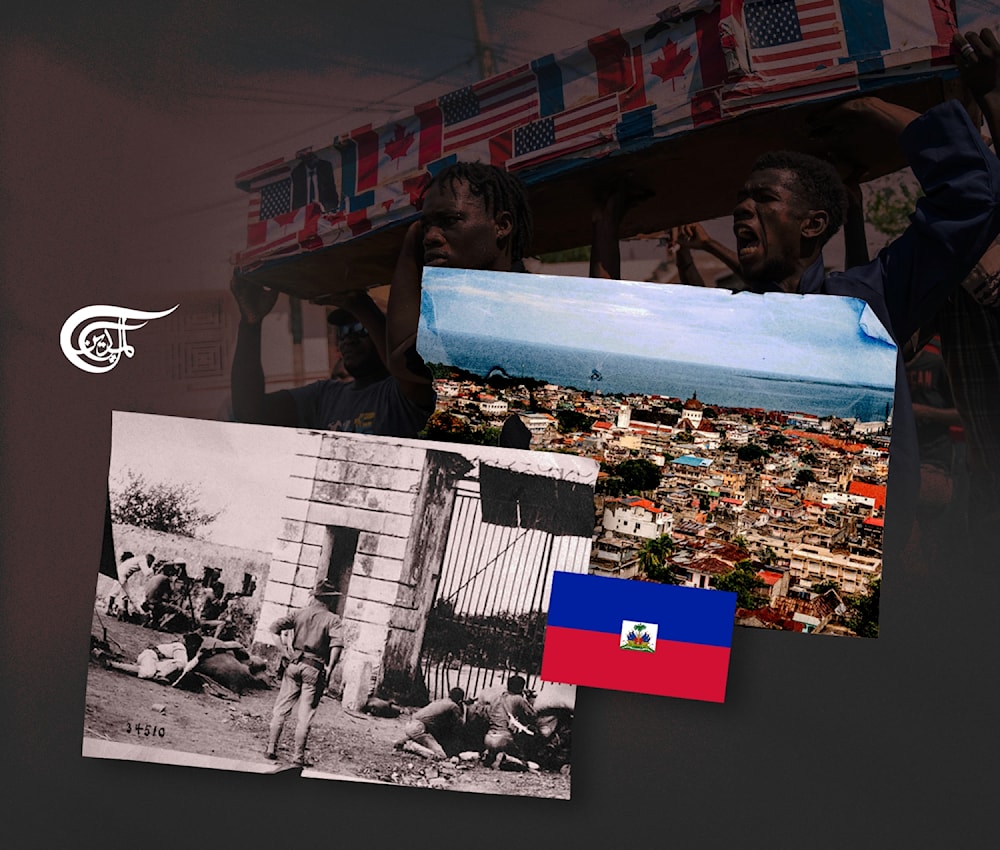The Caribbean and colonialism: The Haitian crisis and its causes
In reality, the Haitian crisis has persisted for several decades, with its roots tracing back to the American occupation that began in 1915.
-

Describing current events in Haiti, the Western press does not talk about their background. (Illustrated by Mahdi Rtail; Al Mayadeen English)
Once upon a time, sailors and travelers considered Haiti the pearl of the Caribbean. But now this territory is beset by a wide range of problems, including an economic crisis, a surge in crime, internal civil conflict, and rising poverty levels. Prospects are vague: few people can currently accurately predict how events will develop. Against the backdrop of ongoing armed clashes in Port-au-Prince, which are still ongoing, this article delves into the root causes of the turmoil.
Formally, the current crisis in Haiti began in 2018, when unrest broke out due to fuel shortages. However, this interpretation is too simplistic. In reality, the Haitian crisis has persisted for several decades, with its roots tracing back to the American occupation that began in 1915.
In fact, the events a hundred years ago caused irreparable damage to Haitian statehood. For 19 years, US troops illegally controlled the territory and resources of the Caribbean republic. And even after Haiti managed to regain its independence, American influence did not dissipate. It continued and was aimed at economic exploitation. This was 20th-century colonialism. However, now they rarely remember this.
Describing current events in Haiti, the Western press does not talk about their background. Not a word about the forced labor of Haitian citizens, which American sugar companies used in the 20s of the last century on the island’s plantations. Not a word about how, during the occupation, Haiti's financial structures were dominated by US banks. Not a word about how the American military regime in Haiti from 1915 to 1934 violated the rights of the Haitian population and harmed the culture and traditions of the occupied country.
But those events explain a lot. In 1915, American Marines invaded Haiti, under the pretext of "protecting American interests"; especially economic interests (American sugar companies were afraid of losing control over Haitian plantations). Now, in 2024, the US Army Command and the State Department have not publicly ruled out sending troops to Haiti. What has changed in 109 years? It turns out… almost nothing. America still considers the Caribbean its backyard and interferes in the internal affairs of the regional countries.
The American occupation of Haiti was so brutal that since 1915, a guerrilla war for liberation from US troops had been ongoing on the island. In 1919, Haitian guerrilla leader Charlemagne Péralte died at the hands of the American soldiers. But his name forever became a symbol of heroism in Haiti. As in those days, so do many Haitians now stand for the sovereignty and independence of their homeland against colonial dependence on the United States, because they understand well that the plight of their state is the consequence of Western colonialism.
American interventions in Haiti did not cease in the 1930s. Washington conducted armed interventions on the island both in the 1990s and in the 2000s. The potential for a recurrence of this detrimental scenario exists today.
Haiti has everything it needs to be an independent and stable state. It has natural resources (copper, gold, crops) and unique traditions that have developed over centuries (the country's cultures are influenced by Africa, Latin America, and the Caribbean). It enjoys an advantageous geographical location that could attract an influx of tourists.
However, it is not the people of Haiti who still benefit from all this, but rather Western corporations that control a significant number of enterprises, mines, and agricultural areas in Haiti.
And this state of affairs brings us back to the topic of neocolonialism. When Washington declares its interest in the situation in Haiti, it is not genuinely concerned about the population of this Caribbean country. This is a hypocritical attempt to conceal its own colonial economic interests. It also serves as a political game with its own electorate (as the potential mass arrival of refugees from unrest-ridden Haiti has recently become a significant topic of election discussions in the United States).
From all of the above, three conclusions can be drawn:
1. The severe consequences of the American occupation of Haiti in 1915-1934 still have a dire impact on the internal life of the republic. The economic interference of Western companies in the affairs of Haiti has persisted from then until the present.
2. The American establishment's ideas about possible armed intervention in Haiti demonstrate that Washington does not respect the right of the Haitian people to govern their country independently. Such colonial arrogance and disrespect on the part of the West extends to other territories of the Caribbean (one can recall, for example, the recent attempt by the British authorities to impose so-called direct rules on the inhabitants of the British Virgin Islands).
3. With sufficient resources and an advantageous geographical location, Haiti can become a prosperous country. But in order to achieve this, it is important to overcome the consequences of colonial expansion.

 Alexander Tuboltsev
Alexander Tuboltsev
 5 Min Read
5 Min Read











